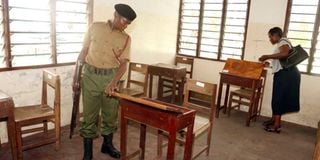Premium
Exam cheating returns to Kisii with arrest of varsity student

A security officer and an invigilator make sure candidates for a past KCPE exam are not hiding any written material under their desks.
The ugly past of examination cheating has reared its head again in Kisii County as the 2021 Kenya Certificate of Secondary Education (KCSE) exam kicked off on Monday.
The region was previously marked as a hotspot for exam malpractices, prompting education officials and security agencies to intensify measures to nip the vice in the bud.
On Tuesday, police arrested a 20-year-old university student over suspected impersonation.
The student was sitting English Paper 1 for a private student at Kiamabundu Mixed Secondary School near Kisii town.
Supervisors and invigilators at the school detected anomalies and started investigating.
Kisii County Education Director Pius Ngoma told the Nation that officials had adopted several measures to curb examination cheating.
“We roped in chiefs in our sensitisation programme to end examination cheating in the region. The chiefs held barazas and used every available opportunity to discourage exam cheating. They told residents the dangers of cheating in education,” he said.
He noted that a stern warning had been issued to teachers and candidates before the exams started.
“We told supervisors and invigilators to be very vigilant,” he said, noting that parents were directed by school administrators to take exams seriously and avoid shortcuts for their children.
Kisii Central Police Commander Peter Kimani said they are on the lookout for any irregularities.
"It is good we detected the Monday impersonation case in good time. We are even more vigilant to ensure honesty in the exams,” he said.
At least 11 suspects posing as candidates were arrested in 2020 at Milimani Ramasha Academy in Kisii County over impersonation.
They included unemployed trained teachers. The proprietor of the school was also arrested. Other fake candidates escaped when they realised they had been detected by examination officials and police.
Education Cabinet Secretary George Magoha described the case as an “advanced type” of cheating.
Past cheating attempts
Kisii County has been on the Kenya National Examinations Council’s (Knec) radar over cheating attempts. It is a complex web that includes parents, students, teachers, invigilators, supervisors, school management and some education officials.
The Education ministry last year flagged Kisii, Migori and Homa Bay counties as exam-cheating hotspots. The ministry said perpetrators were using new and advanced tactics to outwit authorities, but warned that their days were numbered.
In impersonation cases, photos of candidates do not often match those of the people doing the tests.
The impersonators enter examination rooms pretending to be students so that they can write examinations on behalf of some candidates. They enter with their own photographs, which are then embedded in the Knec schedules. A Knec schedule is a document that is used to identify a particular candidate in an examination room.
Preliminary investigations indicate that parents pay up to Sh200,000 to the school management and are then asked to bring their preferred persons who would sit exams for their children. A further amount of money is paid to the impersonators.
Sources indicate that impersonation schemes are preplanned.
Education officials said it is the duty of the centre manager to identify candidates to the supervisor. The supervisor then confirms the candidates' photos and other details.
The real candidates often go underground during the exam period to avoid raising suspicion.
Last year, 17 people suspected of involvement in examination irregularities were arrested in Nyamira and Migori counties.




